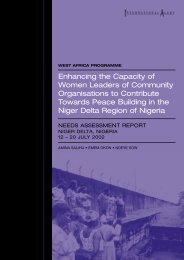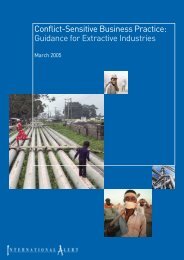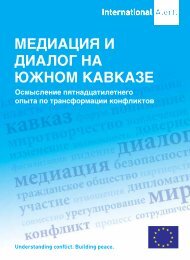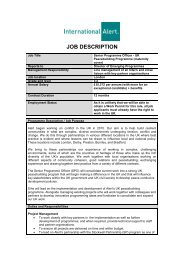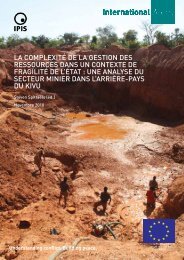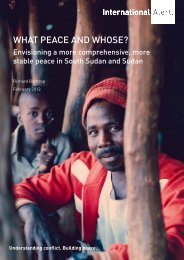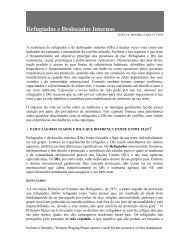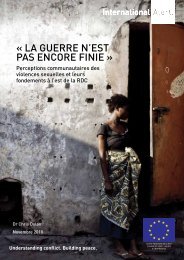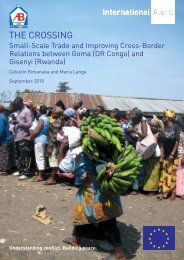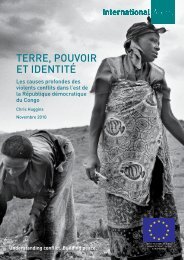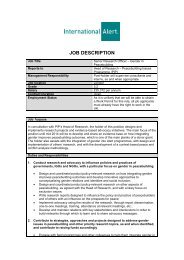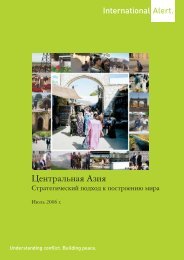Walking in the Dark: informal Cross-border trade ... - International Alert
Walking in the Dark: informal Cross-border trade ... - International Alert
Walking in the Dark: informal Cross-border trade ... - International Alert
You also want an ePaper? Increase the reach of your titles
YUMPU automatically turns print PDFs into web optimized ePapers that Google loves.
<strong>Walk<strong>in</strong>g</strong> <strong>in</strong> <strong>the</strong> <strong>Dark</strong>: Informal <strong>Cross</strong>-<strong>border</strong> Trade <strong>in</strong> <strong>the</strong> Great Lakes Region<br />
29<br />
personnel). They are placed along <strong>the</strong> road <strong>in</strong> order to approach small <strong>trade</strong>rs and direct <strong>the</strong>m<br />
to <strong>the</strong> taxation offices. They receive no salary and carry no official state symbols, such as a<br />
badge or uniform, etc. Therefore, not only must <strong>the</strong>y collect taxes on behalf of <strong>the</strong> various<br />
official bodies, but <strong>the</strong>y must also ensure <strong>the</strong>ir own survival, which of course <strong>in</strong>creases <strong>the</strong><br />
pressure placed on <strong>the</strong> <strong>trade</strong>rs.<br />
At certa<strong>in</strong> cross<strong>in</strong>g po<strong>in</strong>ts, <strong>the</strong> level of <strong>in</strong>formality is higher than elsewhere: for example, at a<br />
location some distance from <strong>the</strong> Uvira site (Luvungi-Rugongo), only <strong>in</strong>formal taxes are collected.<br />
Paradoxically, this is done with great efficiency through a sort of “one-stop counter”, which is<br />
responsible for collect<strong>in</strong>g money from <strong>trade</strong>rs and <strong>the</strong>n ensur<strong>in</strong>g it reaches <strong>the</strong> various agencies<br />
concerned (DGDA, DGM or <strong>border</strong> police). The receipts issued by this counter are produced<br />
locally and carry an official stamp, although <strong>the</strong>y do not use official taxation rates and are not<br />
transferred to <strong>the</strong> higher <strong>in</strong>stitutions. 80<br />
This situation, which <strong>in</strong>volves so many agencies and different actors, results <strong>in</strong> a high level of<br />
taxation on <strong>the</strong> Congolese <strong>border</strong>: 81 70 percent of goods <strong>in</strong> Bukavu, 87 percent of goods <strong>in</strong> Uvira,<br />
and 66 percent of goods <strong>in</strong> Ariwara are taxed. Our analysis above would suggest that <strong>the</strong>re is<br />
a high level of <strong>in</strong>formal taxation: <strong>the</strong> figures are high <strong>in</strong> Bukavu (55 percent <strong>in</strong>formal taxation<br />
compared to 35 percent formal) and very high <strong>in</strong> Uvira (79 percent <strong>in</strong>formal and 13 percent<br />
formal), but low <strong>in</strong> Ariwara (13 percent <strong>in</strong>formal and 58 percent formal 82 ). Accord<strong>in</strong>g to <strong>the</strong> data<br />
produced by <strong>the</strong> study, <strong>the</strong> agencies collect<strong>in</strong>g <strong>the</strong> highest level of <strong>in</strong>formal taxes <strong>in</strong> Bukavu were<br />
<strong>the</strong> OCC (which taxes 40 percent of <strong>trade</strong>rs), <strong>the</strong> hygiene department (27 percent of <strong>trade</strong>rs) and<br />
<strong>the</strong> DGDA (16 percent of <strong>trade</strong>rs). At <strong>the</strong> Uvira site, <strong>the</strong> most prolific agencies <strong>in</strong> terms of <strong>in</strong>formal<br />
taxation were <strong>the</strong> DGDA (54 percent), military personnel (45 percent), hygiene department (43<br />
percent), <strong>the</strong> DGM (39 percent), <strong>the</strong> OCC (23 percent) and <strong>the</strong> <strong>border</strong> police (17 percent), which<br />
provides an <strong>in</strong>dication of <strong>the</strong> high levels of <strong>in</strong>formal taxation at this site. In Ariwara, only <strong>the</strong><br />
immigration services collected a significant percentage of <strong>in</strong>formal payments (13 percent).<br />
These <strong>in</strong>formal taxes have very different values: <strong>in</strong> Bukavu it is quite low at USD0.30 for each formally<br />
taxed <strong>trade</strong>r and USD0.17 for each <strong>in</strong>formally taxed <strong>trade</strong>r. By contrast, taxes are much higher at <strong>the</strong><br />
Uvira site: USD1.55 for each formally taxed <strong>trade</strong>r and USD1.77 for each <strong>in</strong>formally taxed <strong>trade</strong>r (for<br />
imports and exports). At <strong>the</strong> Ariwara site, <strong>the</strong> figures are USD1.47 and USD1.20 respectively. 83<br />
The level of <strong>in</strong>formal taxation is <strong>the</strong>refore very high <strong>in</strong> DRC: <strong>in</strong> some cases <strong>the</strong>re are more people<br />
pay<strong>in</strong>g <strong>in</strong>formal than formal taxes, and <strong>in</strong> o<strong>the</strong>rs <strong>in</strong>formal taxes are higher than formal taxes. At<br />
<strong>the</strong> Uvira site <strong>in</strong> particular, <strong>the</strong> level of <strong>in</strong>formal taxation is extremely high: 79 percent of taxes<br />
paid are <strong>in</strong>formal and just 13 percent are formal.<br />
In summary, a wide variety of actors operat<strong>in</strong>g on <strong>the</strong> Congolese <strong>border</strong> are <strong>in</strong>volved <strong>in</strong> <strong>the</strong> collection<br />
of formal and <strong>in</strong>formal taxes. The high level of <strong>in</strong>formal taxation leads to a significant degree of<br />
confusion, as is clear from <strong>the</strong> testimony provided by one female <strong>trade</strong>r: ‘What is surpris<strong>in</strong>g is that<br />
<strong>the</strong>se services are full of agents and sometimes we don’t know who to talk to. At one post you might<br />
even have five people talk<strong>in</strong>g to you. So you wonder which one to listen to’. 84 The way <strong>in</strong> which <strong>the</strong><br />
many taxes (both formal and <strong>in</strong>formal) are requested creates a high level of unpredictability. Traders<br />
pay taxes not only at <strong>the</strong> <strong>border</strong> but also at barriers along <strong>the</strong> road, at <strong>the</strong> entrance to <strong>the</strong> market<br />
and <strong>in</strong> <strong>the</strong> market itself, etc. Additionally, <strong>the</strong> way <strong>in</strong> which <strong>the</strong>y are demanded is particularly harsh:<br />
failure to pay results <strong>in</strong> harassment at best, and <strong>in</strong> many cases <strong>the</strong> confiscation of goods. Traders<br />
compla<strong>in</strong> about unfair treatment at <strong>the</strong> hands of public officials, who <strong>the</strong>y say ‘start harass<strong>in</strong>g us and<br />
80 Interviewers’ debrief<strong>in</strong>g, Uvira, 16th October 2011.<br />
81 Details to be found <strong>in</strong> appendices 56-68.<br />
82 As expla<strong>in</strong>ed above, <strong>the</strong> actual levels of <strong>in</strong>formal taxation <strong>in</strong> Arua are likely to be higher than <strong>in</strong>dicated <strong>in</strong> <strong>the</strong> collected data.<br />
83 Details to be found <strong>in</strong> appendices 56-68.<br />
84 Focus group discussion, Ruzizi (<strong>border</strong> po<strong>in</strong>t), 21st October 2011.



